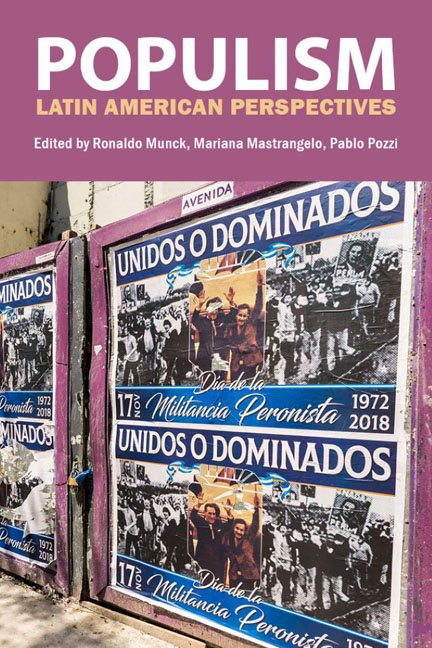Book contents
- Frontmatter
- Contents
- Abbreviations and acronyms
- Foreword
- Introduction
- 1 Populism in Latin America: development, democracy and social transformation
- 2 Peronism in Argentina: left or right?
- 3 The populist left in Chile: socialists and communists from 1936 to 1973
- 4 The left and the Workers’ Party in Brazil: a party between populism, social policies and the popular vote
- 5 Brazil, Bolsonaro and populism of the right
- 6 Political dilemmas of the government of López Obrador: between populism, democracy and the left in Mexico
- 7 The Bolivarian process in Venezuela: socialism, populism or neoliberalism?
- 8 Populist responses to crises of market democracy: the case of Bolivia’s Evo Morales
- 9 Ecuador: populism and the 2007– 17 political cycle
- 10 The Nicaraguan crisis and the mirage of left populism
- 11 Populism and the right in Latin America
- 12 Populism and the left in Latin America
- Afterword: a tale of two “people”: national popular and twenty-first-century Latin American populisms
- Contributors
- Index
5 - Brazil, Bolsonaro and populism of the right
Published online by Cambridge University Press: 23 January 2024
- Frontmatter
- Contents
- Abbreviations and acronyms
- Foreword
- Introduction
- 1 Populism in Latin America: development, democracy and social transformation
- 2 Peronism in Argentina: left or right?
- 3 The populist left in Chile: socialists and communists from 1936 to 1973
- 4 The left and the Workers’ Party in Brazil: a party between populism, social policies and the popular vote
- 5 Brazil, Bolsonaro and populism of the right
- 6 Political dilemmas of the government of López Obrador: between populism, democracy and the left in Mexico
- 7 The Bolivarian process in Venezuela: socialism, populism or neoliberalism?
- 8 Populist responses to crises of market democracy: the case of Bolivia’s Evo Morales
- 9 Ecuador: populism and the 2007– 17 political cycle
- 10 The Nicaraguan crisis and the mirage of left populism
- 11 Populism and the right in Latin America
- 12 Populism and the left in Latin America
- Afterword: a tale of two “people”: national popular and twenty-first-century Latin American populisms
- Contributors
- Index
Summary
In the political analysis of Latin America and Brazil, when we mention “populism”, we immediately think about the long tradition of figures such as Getúlio Vargas (Brazil), Juan Domingo Perón (Argentina), Lázaro Cárdenas del Rio (Mexico) or José María Velasco Ibarra (Ecuador). It relates to a time when Latin America was going through a period of intense and complex processes of modernization and inclusion of the working class, within the framework of labour laws and political democracy. More recently, we have witnessed a “return” of populism in Latin America as elsewhere, but now in a conservative version and in a particular context in macroeconomic terms. Unlike the “classical” era of populism, the current neoliberal hegemony has led to a reduction of the role of the state, in favour of greater freedom for capital flows and a shrinking of the labour market, of social policies, of labour rights, and so on. Latin American presidents, characterized by their populist appeal, were very much part of this conjuncture, such as Alberto Fujimori (Peru) and Fernando Collor de Mello (Brazil). What does this new populism of the right signify? How does it relate to the classic populism and the original incorporation of the masses into the democratic order?
These debates are not just a concern from a historiographical or sociological point of view. They are part of the current political process itself, in the sense of building a political programme and claiming political traditions. In this sense, as a way of trying to counteract the neoliberal agenda put into practice in Brazil throughout the 1990s, and also of forming a political opposition to the governments of Fernando Collor de Mello and Fernando Henrique Cardoso, the Workers’ Party – Partido dos Trabalhadores (PT) – claimed the tradition of national developmentalism (Perlatto 2016). This tradition, which came from Getúlio Vargas (and the subsequent governments of Juscelino Kubitschek and João Goulart) implied a commitment to industrialization and modernization of the country and included the incorporation of the working population into citizenship via the Labour Court. However, it was achieved without shaking the foundations of the primary sector of the economy, based on the large exporting rural areas, and thus was some kind of compromise state.
- Type
- Chapter
- Information
- PopulismLatin American Perspectives, pp. 85 - 102Publisher: Agenda PublishingPrint publication year: 2023



